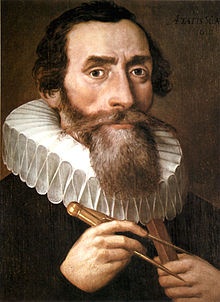Kepler proposes eliptical orbits
Johannes Kepler was the man who broke the grip of circular orbits that astronomers had failed to loosen in the nearly 2000 years since Plato and Aristotle. Kepler was Tycho Brahe’s associate and successor. He used the massive store of precise data Brahe had amassed to propose that the planets travelled in elliptical orbits rather than circular ones, slowing down as they travelled farther from the Sun and speeding up as they grew nearer.
 Kepler wasn’t especially happy to propose elliptical orbits. He was an accidental mathematician
and astronomer who had hoped to enter the Lutheran ministry. Kepler only becoming a mathematician
when a math teacher suddenly died and he was drafted to take the man’s place. (You can’t make this
stuff up.) He said his goal in astronomy was to gain a deeper understanding of the God-geometer
who created the Universe. Theological connections can be found throughout his (and almost all of
his contemporaries’) writings.
Kepler wasn’t especially happy to propose elliptical orbits. He was an accidental mathematician
and astronomer who had hoped to enter the Lutheran ministry. Kepler only becoming a mathematician
when a math teacher suddenly died and he was drafted to take the man’s place. (You can’t make this
stuff up.) He said his goal in astronomy was to gain a deeper understanding of the God-geometer
who created the Universe. Theological connections can be found throughout his (and almost all of
his contemporaries’) writings.
Kepler had been working under Tycho Brahe on understanding Mercury’s orbit when Brahe suddenly died, leaving Kepler as his successor, but not heir to his data. As reluctant as Kepler was to consider unconventional ideas about the cosmos, Brahe’s heirs were even more upset to see him using their relative’s data to promote an idea Brahe had thought wrong. They tried to prevent Kepler from using their ancestor’s data. Some historians believe Kepler stole the data he needed. Some believe Kepler murderd his mentor to gain access to the data - poisoning him, ironically, with mercury. Modern tests confirm that Brahe was almost certainly intentionlly poisoned with mercury.
As with so many major steps in science, we image that Kepler’s ideas and arguments were quickly accepted, but that is very seldom true. For example Galileo, who is so famous for promoting the works of Copernicus, had access to Kepler's work but neither used nor mentioned them in his defense of a sun-centered cosmos, despite their tremendous power to address weaknesses in the Copernican model.
We give credit to Kepler because he was right, he backed up his ideas with a well reasonsed analysis of available data, and his ideas were accepted while people still remembered him.